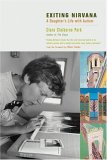Summary | Excerpt | Reviews | Readalikes | Genres & Themes | Author Bio

Critics' Opinion:
Readers' Opinion:
First Published:
Mar 2001, 225 pages
Paperback:
Mar 2002, 240 pages
I begin to correct her. But she anticipates me. "Not hurt his feelings, irritated!" She remembered! This is the first time she's ever made the distinction. Except, except... except that he wasn't irritated. He's known Jessy from childhood, and makes allowances. How to explain that and still convey the necessity of self-control? Words, feelings, contexts, human meanings. We'll be working on these for years to come.
Forty years. The middle of the journey. The middle of her journey; nearer the end of mine. But I had better begin nearer the beginning, where I began thirty-four years ago, when I first realized there was a story to tell.
We start with an image --a tiny, golden child on hands and knees, circling round and round a spot on the floor in mysterious, self-absorbed delight. She does not look up, though she is smiling and laughing; she does not call our attention to the mysterious object of her pleasure. She does not see us at all. She and the spot are all there is, and though she is eighteen months old, an age for touching, tasting, pointing, pushing, exploring, she is doing none of these. She does not walk, or crawl up stairs, or pull herself to her feet to reach for objects. She doesn't want any objects. Instead, she circles her spot. Or she sits, a long chain in her hand, snaking it up and down, up and down, watching it coil and uncoil, for twenty minutes, half an hour, longer...
It was like that; that was when we began to know.
To know what? Today, any reasonably savvy pediatrician would know what, would recognize autism when she saw it in as pure a form as this. Autism is when your two-year-old looks straight through you to the wall behind --you, her mother, her father, sister, brother, or anybody else. You are a pane of glass. Or you are her own personal extension, your hand a tool she uses to get the cookie she will not reach for herself. Autism is when your three-year- old sorts her blocks by shape and color so you can't think she's retarded. Autism is when your eight-year-old fills a carton with three-quarter-inch squares of cut-up paper to sift between her fingers for twenty minutes, half an hour, longer. Autism is when your eleven-year-old fills sheet after sheet with division, division by 3, by 7, 11, 13, 17, 19....But that's enough, there are many books about autism now, anyone can read the symptoms. I need the image for what the symptoms don't convey: this child was happy. Is it not happiness to want nothing but what you have? Craving, the Buddha taught, is the source of all suffering, detachment the road to the serene equilibrium of Nirvana.
But Nirvana at eighteen months? That's too soon.
Yet I must start with that happiness, if only because, in those bad years, it was so thoroughly denied. Only in a few psychoanalytic backwaters is it still believed that the autistic child, like the so-called zombies of the concentration camps, is withdrawing from unbearable agony. This now discredited notion was once widely accepted, thanks to the journalistic skills of Bruno Bettelheim. "Autistic children...fear constantly for their lives," he wrote. "The precipitating factor in infantile autism is the parent's wish that his child should not exist." His? The sentence comes from a section headed "The Mother in Infantile Autism." I could quote more, but I won't. It is painful to return to the book Bettelheim, with his gift for metaphor, called The Empty Fortress --and thank God and the rules of evidence, it has become unnecessary. Autism is now almost universally recognized as a developmental disorder, multiply caused: genetic predisposition, pre- or postnatal viral infection, chromosomal damage, biological agents still unknown. Magnetic resonance imaging shows brain anomalies. So do autopsies. The research goes on. Every bit of it, however little it can as yet contribute to our own child's habilitation --unlike Bettelheim, we do not speak of cure --buries deeper the injustice of that terrible accusation.
Copyright © 2001 by Clara Claiborne Park





The House on Biscayne Bay
by Chanel Cleeton
As death stalks a gothic mansion in Miami, the lives of two women intertwine as the past and present collide.

The Flower Sisters
by Michelle Collins Anderson
From the new Fannie Flagg of the Ozarks, a richly-woven story of family, forgiveness, and reinvention.

The Funeral Cryer by Wenyan Lu
Debut novelist Wenyan Lu brings us this witty yet profound story about one woman's midlife reawakening in contemporary rural China.
Your guide toexceptional books
BookBrowse seeks out and recommends the best in contemporary fiction and nonfiction—books that not only engage and entertain but also deepen our understanding of ourselves and the world around us.